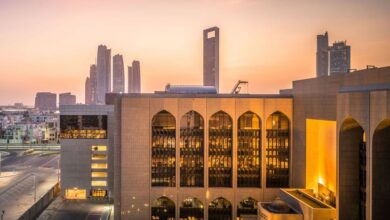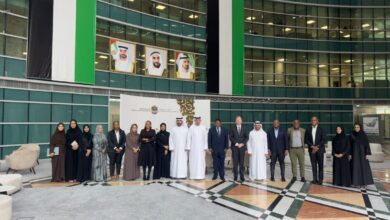MRO Middle East and Aircraft Interiors Middle East 2022 highlights return of robust aviation industry
MRO Middle East & Aircraft Interiors Middle East (AIME) 2022 was inaugurated today by H.H. Sheikh Ahmed bin Saeed Al Maktoum, President, Dubai Civil Aviation Authority, Chairman and Chief Executive of Emirates Airline and Group, amid a strong industry outlook.
A busy launch of the two-day show taking place at Dubai World Trade Center (DWTC), welcomed industry leaders, buyers and specialists from across the aircraft interiors and maintenance, repair and overhaul (MRO) segment of the aviation industry.
During the opening day of MRO Middle East and AIME, Dubai carrier flydubai signed a multi-year agreement with Boeing for parts provisioning and Quick Engine Change (QEC) kits to support the all-Boeing flydubai fleet. These new contracts will enable flydubai to support more efficient maintenance processes and control inventory costs.
“As we begin to see the demand for travel returning, ensuring that our passengers arrive at their destination without delay is of utmost importance,” said Captain Chris Grazel, Chief Operating Officer at flydubai.
Additionally, Joramco signed an agreement with Proponent, the world’s largest independent aerospace parts distributor for supplies of consumables and expendables. Also at the show, Joramco extended an agreement with Satair covering the supply of consumables and expendables for the support of Boeing and Airbus aircraft.
“The industry has seen a remarkable return of optimism, which we’re seeing translated into contracts and partnerships at the show, representing exciting ongoing business opportunities for the aircraft interiors and MRO community. This year’s edition has already surpassed pre-covid visitor numbers, both from a local and international perspective with an increased participation from global airlines and international trade delegations. ” said Tim Hawes Managing Director of Tarsus Middle East, one of the show organisers along with Aviation Week Network.
Brian Kough, Senior Director, Forecasts & Aerospace Insights at Aviation Week Network, presenting an industry forecast for the Middle East at the show’s Go Live! Theater said that although the aviation market is volatile, Middle East aircraft utilisation in 2021 was up by 25% compared to 2020, and the in-service fleet is seen recovering this year to above the 2019 levels with more 31,800 aircraft.
He expects the worldwide MRO industry to witness a 3.2% CAGR over the 2022-2031 period to be valued at $1 trillion. Meanwhile, engine MRO demand will grow at 3.7% to be valued at $474 billion over the next decade. Specifically, Middle East demand for MRO will be $12.9 billion by 2031. Additionally, narrow-body aircraft will be the key growth drivers over the decade, with over 20,000 worldwide deliveries expected.
“The expected industry growth is a clear sign of recovery, which will be underlined by enhanced innovation and digital-led technologies necessary for future resilience. We’re glad to see that the conference content is providing critical learning opportunities that will drive a strong recovery of the aviation industry,” said Lydia Janow, SVP Events at Aviation Week Network.
The Go Live! Theater covered critical topics for cabin interiors and MRO; sessions throughout the day focused on regional MRO insights and leadership strategy, MRO operator’s perspective, sustainable interiors, aircraft connectivity and the future travellers. Speakers included representatives from Emirates, Etihad Engineering, Jazeera Airways, Lufthansa Technik, Wizz Air, Ryanair, Joramco, and SAEI.
Robbie Bourke, Partner at Oliver Wyman, participating at the Go Live! Theater, said: “As aviation rebounds from the disruption of the past two years, it is pleasing to see our colleagues coming together once again at the region’s leading industry event. MRO spend in 2022 and 2023 is expected to exceed 2019 levels, as aircraft get back in service and the backlog of maintenance is cleared. Supply chain challenges, however, are a key focus for the industry right now, and although not exclusively an aviation challenge, it is one factor that is adding some pressure on the expected rebound.”
Burke added: “As we look beyond the next few years and the rebound of aviation, the challenge of climate change is a key focus for the industry. As a sector that is hard to decarbonize, it isn’t easy and this will take time to make progress. One thing for certain though is the commitment of the industry, with fuel efficiency, sustainable aviation fuels and new means of propulsion with hydrogen and electric being the key pathways forward for the industry.
“WAM/ئ /Tariq alfaham/Hatem Mohamed


